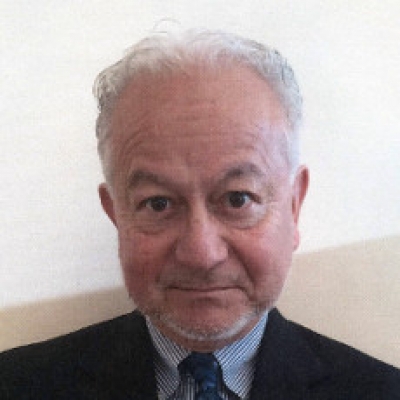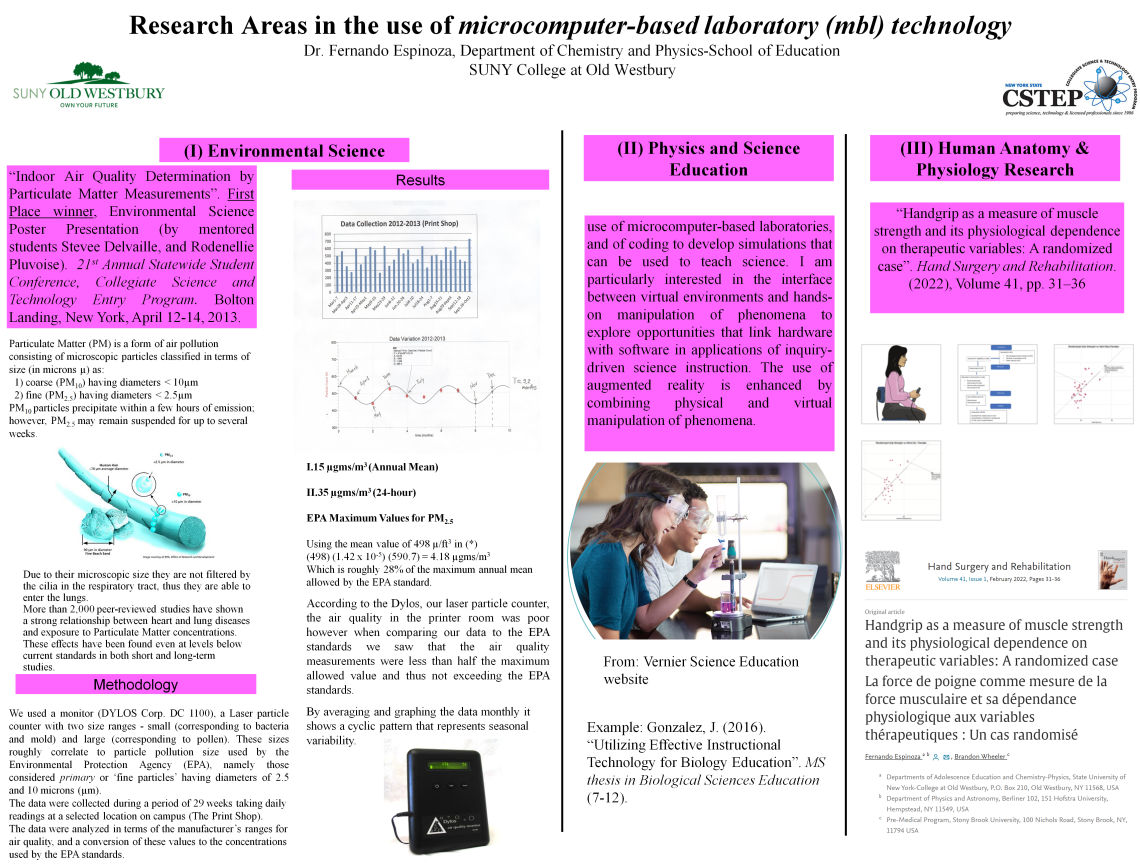
Position/Role
Professor
Coordinator of Graduate Programs in Science Education
Department
School
Building
New Academic Building
Room
1003
Phone
E-mail
Courses Taught
- Nature and Development of Science (undergraduate and graduate)
- Topics in Earth and Space Science (graduate)
- Methods of Teaching Science in Secondary School (undergraduate and graduate)
- Literacy, Research, and Technology in Science Education (graduate)
- Thesis Research (graduate)
- Wave Motion: Light and Sound (undergraduate)
Degrees
- Ed.D. Columbia University, New York, NY
- M.A. Queens College, Flushing, NY
- B.A. Queens College, Flushing, NY
Honors & Awards
Member of the inaugural SUNY Research Leadership Academy, designed to facilitate scientific communication and public engagement with science.
Research Interests
- Exposure determination in Particulate Matter (PM), and Radio Frequency-Electromagnetic (RF-EMF) radiation.
- Cognitive aspects of learning mechanics-Wave motion as inquiry (Physics Education Research)
- Nature of Science (Science Education)
- Inquiry-based instruction (Science Education)
- Use of microcomputer-based laboratories in learning science (Science Education)
Publications
- Fernando Espinoza. Scientifically speaking we know a lot, or do we? a model of knowledge using the electromagnetic spectrum, 23 January 2023, PREPRINT (Version 1) available at Research Square [https://doi.org/10.21203/rs.3.rs-2497295/v1] “Time as a Field: Envisioning Its Qualitative and Quantitative Aspects”. In: Cole, D.R., Rafe, M.M., Yang-Heim, G.Y.A. (eds) Educational Research and the Question(s) of Time. (2024) Springer, Singapore. https://doi.org/10.1007/978-981-97-3418-4_30
- “An Inquiry-Based Instructional Model to Teach Scientific Concepts Using Time as a Field: Examples from Biology and Physics” Hofstra University Teaching and Learning Conference. January 24, 2024.
- "Scientifically speaking we know a lot, or do we? a model of knowledge using the electromagnetic spectrum". https://www.researchsquare.com/article/rs-2497295/v1rnando Espinoza. Scientifically speaking we know a lot, or do we? a model of knowledge using the electromagnetic spectrum, 23 January 2023, PREPRINT (Version 1) available at Research Square [https://doi.org/10.21203/rs.3.rs-2497295/v1]Fernando Espinoza. Scientifically speaking we know a lot, or do we? a model of knowledge using the electromagnetic spectrum, 23 January 2023, PREPRINT (Version 1) available at Research Square [https://doi.org/10.21203/rs.3.rs-2497295/v1]
- “Handgrip as a measure of muscle strength and its physiological dependence on therapeutic variables: A randomized case”. Hand Surgery and Rehabilitation. (2022), Volume 41, pp. 31–36. https://doi.org/10.1016/j.hansur.2021.11.001
- “Does size matter? Animal, living and non-living classification, implications for teaching”. International Journal of Educational Methodology, (2021), Volume 7, No.3, pp. 465-472. https://doi.org/10.12973/ijem.7.3.465
- "Impact of Guided Inquiry with Simulations on Knowledge of Electricity and Wave Phenomena". European Scientific Journal, ESJ, 16 (33), 1. Nov. 30 (2020). https://doi.org/10.19044/esj.2020.v16n33p1
- “The impact on cognitive development of a self-contained exploratory and technology-rich course on the physics of light and sound”. Cognitive Informatics, Computer Modeling, and Cognitive Science. Theory, Case Studies, and Applications. G.R. Sinha and J. S. Suri, Editors. Elsevier (2020). Volume 1, pp. 55-70.
- “Scientifically Speaking We know a lot, or do we?” One Giant Leap, Apollo 11@50. One Giant Leap: Political and Cultural Impacts of the Race to the Moon Conference. Hofstra University. Tuesday and Wednesday, April 2-3, 2019.
- “SUNY-Venezuela COIL Academy”. State University of New York’s Center for Collaborative Online International Learning (COIL). Universidad La Salle; Casa Tetela Conference Center, Cuernavaca, Mexico, March 25-28, 2019.
- “Impact of Guided Inquiry through Simulations on the Improvement and Retention of Knowledge of Electricity and Wave Motion.” New Jersey American Association of Physics Teachers, Regional Meeting, Bergen Community College, November 16-17, 2018.
- “Wave Motion as Inquiry: The Physics and Applications of Light and Sound”. Springer Nature. (2017). ISBN: 978-3-319-45756-7 (Print), 978-3-319-45758-1 (eBook).
- “Manipulation and Physicality in the Understanding of Wave Motion as Inquiry” 25th Annual Conference on Instructional Technologies (CIT) at SUNY Potsdam, May 31-June 3, 2016.
- “Graphical Representations and the Perception of Motion: Integrating Isomorphism Through Kinesthesia into Physics Instruction”. Journal of Computers in Mathematics and Science Teaching (2015). Volume 34, Issue 2, (pp. 133-154).
- “Scientifically speaking we know a lot, or do we? A model to represent knowledge of the natural world.” Paper presented at the Sixth International Conference on Science in Society. UBC Robson Square, Vancouver, Canada, October 10-11, 2014.
- “The Nature of Science: Integrating Historical, Philosophical, and Sociological Perspectives”. Rowman & Littlefield Publishers Inc. (2012). ISBN: 978-1-4422-0951-0.
- “An Inquiry-Based Contextual Approach as the Primary Mode of Learning Science with microcomputer-based laboratory technology”. Journal of Educational Technology Systems, (2009-2010), Volume 38, Issue 4, (pp.407-426). With D. Quarless.
Office Hours
- Monday: 1:00pm - 3:00pm
- Wednesday: 4:00pm - 6:00pm
Personal Website

